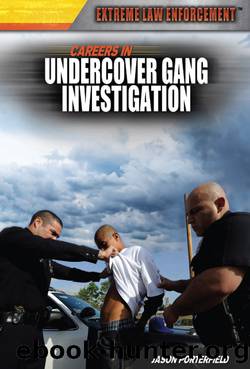Careers in Undercover Gang Investigation by Porterfield Jason;

Author:Porterfield, Jason;
Language: eng
Format: epub
Publisher: Rosen Publishing Group
Police training exercises test how well prospective officers can perform tasks they may face in the field. Here, a man drags a dummy during a citizenâs police academy program.
Officers and detectives need to meet certain physical requirements. Applicants submit to a basic medical review that includes vision and hearing tests. Police departments require a certain level of physical fitness from applicants, who undergo a physical fitness test. The test often includes weight lifting, push-ups, pull-ups, sit-ups, a distance run, and an obstacle course. Some departments have a minimum age of twenty-one and a maximum age of thirty-five or forty for joining.
Prospective officers and detectives also have to go through a strict background check. Often a candidate with a past felony conviction will be disqualified from working in law enforcement. Background checks also bring up any potential problems, such as poor credit history, traffic violations, and drug use. Such a history will not necessarily disqualify a candidate from being hired, but it may raise questions about the applicantâs maturity and decision-making skills. Too many such red flags may indicate a history of irresponsible, reckless, or even illegal behavior.
Education and Experience
Applicants need a minimum of a high school diploma in order to join a police force, but higher education can be beneficial for potential recruits. Some departments may consider otherwise exceptional candidates who hold a General Equivalency Diploma (GED). Recruits who hope to become detectives should consider earning a college degree. Taking college courses can help a candidate gain specialized skills and knowledge and develop communication and critical thinking skills. College also gives students experience in talking to and interacting with people from many different kinds of backgrounds.
Earning a two-year or four-year college degree or accumulating a certain number of college credits can give an applicant an advantage in the hiring process. Many departments now require that police academy candidates earn at least a certain number of college credits. Common majors for police force applicants include criminal justice, forensic sciences, accounting, and computer science. Foreign language majors may also have an advantage in the hiring process. Some departments place an emphasis on hiring officers who are fluent in a foreign language, particularly departments in large cities with large immigrant populations.
Studying a foreign language can be particularly beneficial to candidates who want to do undercover work. Recruits who want to be undercover investigators can also separate themselves from the pack by studying theater or even psychology. These disciplines can equip recruits with the ability to assume another identity and fully inhabit it with confidence, while also teaching them how to closely observe those around them.
Some police departments may give high school students or recent graduates with an interest in law enforcement a chance to learn more about the field by enrolling in a cadet program. The cadets can gain practical experience serving in a role such as âcommunity services officerâ or some other position until they become old enough to apply for the force. Requirements and duties for cadet positions vary from one department to another.
Download
This site does not store any files on its server. We only index and link to content provided by other sites. Please contact the content providers to delete copyright contents if any and email us, we'll remove relevant links or contents immediately.
American History Stories, Volume III (Yesterday's Classics) by Pratt Mara L(5133)
Paper Towns by Green John(4797)
The Giant and How He Humbugged America by Jim Murphy(3286)
The Science Book (Big Ideas Simply Explained) by DK(3135)
The President Has Been Shot!": The Assassination of John F. Kennedy by Swanson James L(2972)
Eleanor & Park by Rainbow Rowell(2943)
The Rape Of Nanking by Iris Chang(2649)
Merriam-Webster's Collegiate Thesaurus, Second Edition by Merriam-Webster Inc(2600)
Harry Potter and the Deathly Hallows (7) by J.K. Rowling(2550)
Ancient Worlds by Michael Scott(2493)
Eligible by Curtis Sittenfeld(2491)
Beautiful Oblivion by Jamie McGuire(2471)
Dork Diaries 12 by Rachel Renée Russell(2268)
Sharp Objects by Gillian Flynn(2153)
The Unlikely Pilgrimage of Harold Fry by Rachel Joyce(2135)
Frankly, Frannie by AJ Stern(2094)
The Astronomy Book by DK(2053)
Forensics by Val McDermid(1976)
Who Was Louis Braille? by Margaret Frith(1883)
